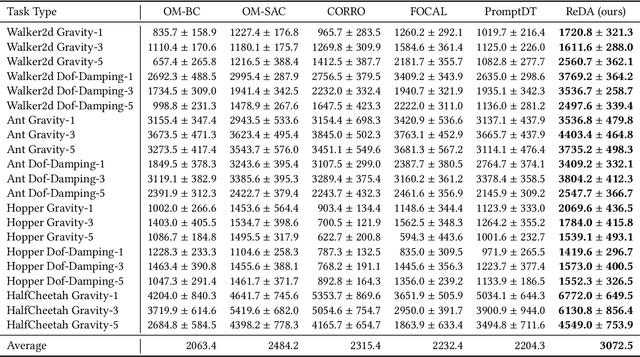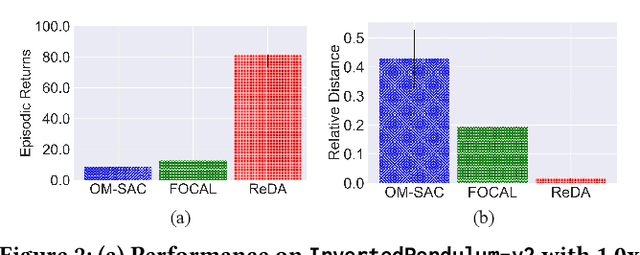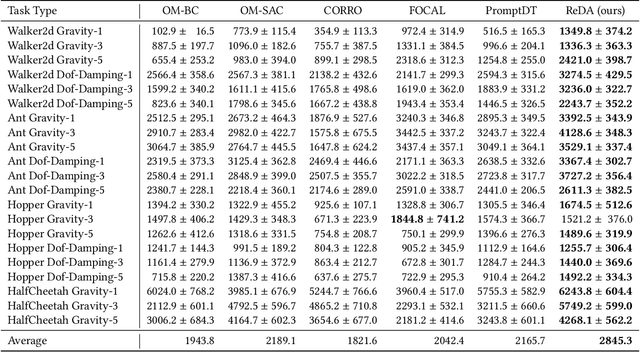Lei Yuan
Multi-agent In-context Coordination via Decentralized Memory Retrieval
Nov 13, 2025



Abstract:Large transformer models, trained on diverse datasets, have demonstrated impressive few-shot performance on previously unseen tasks without requiring parameter updates. This capability has also been explored in Reinforcement Learning (RL), where agents interact with the environment to retrieve context and maximize cumulative rewards, showcasing strong adaptability in complex settings. However, in cooperative Multi-Agent Reinforcement Learning (MARL), where agents must coordinate toward a shared goal, decentralized policy deployment can lead to mismatches in task alignment and reward assignment, limiting the efficiency of policy adaptation. To address this challenge, we introduce Multi-agent In-context Coordination via Decentralized Memory Retrieval (MAICC), a novel approach designed to enhance coordination by fast adaptation. Our method involves training a centralized embedding model to capture fine-grained trajectory representations, followed by decentralized models that approximate the centralized one to obtain team-level task information. Based on the learned embeddings, relevant trajectories are retrieved as context, which, combined with the agents' current sub-trajectories, inform decision-making. During decentralized execution, we introduce a novel memory mechanism that effectively balances test-time online data with offline memory. Based on the constructed memory, we propose a hybrid utility score that incorporates both individual- and team-level returns, ensuring credit assignment across agents. Extensive experiments on cooperative MARL benchmarks, including Level-Based Foraging (LBF) and SMAC (v1/v2), show that MAICC enables faster adaptation to unseen tasks compared to existing methods. Code is available at https://github.com/LAMDA-RL/MAICC.
Multi-agent Embodied AI: Advances and Future Directions
May 08, 2025Abstract:Embodied artificial intelligence (Embodied AI) plays a pivotal role in the application of advanced technologies in the intelligent era, where AI systems are integrated with physical bodies that enable them to perceive, reason, and interact with their environments. Through the use of sensors for input and actuators for action, these systems can learn and adapt based on real-world feedback, allowing them to perform tasks effectively in dynamic and unpredictable environments. As techniques such as deep learning (DL), reinforcement learning (RL), and large language models (LLMs) mature, embodied AI has become a leading field in both academia and industry, with applications spanning robotics, healthcare, transportation, and manufacturing. However, most research has focused on single-agent systems that often assume static, closed environments, whereas real-world embodied AI must navigate far more complex scenarios. In such settings, agents must not only interact with their surroundings but also collaborate with other agents, necessitating sophisticated mechanisms for adaptation, real-time learning, and collaborative problem-solving. Despite increasing interest in multi-agent systems, existing research remains narrow in scope, often relying on simplified models that fail to capture the full complexity of dynamic, open environments for multi-agent embodied AI. Moreover, no comprehensive survey has systematically reviewed the advancements in this area. As embodied AI rapidly evolves, it is crucial to deepen our understanding of multi-agent embodied AI to address the challenges presented by real-world applications. To fill this gap and foster further development in the field, this paper reviews the current state of research, analyzes key contributions, and identifies challenges and future directions, providing insights to guide innovation and progress in this field.
HyperZero: A Customized End-to-End Auto-Tuning System for Recommendation with Hourly Feedback
Jan 30, 2025



Abstract:Modern recommendation systems can be broadly divided into two key stages: the ranking stage, where the system predicts various user engagements (e.g., click-through rate, like rate, follow rate, watch time), and the value model stage, which aggregates these predictive scores through a function (e.g., a linear combination defined by a weight vector) to measure the value of each content by a single numerical score. Both stages play roughly equally important roles in real industrial systems; however, how to optimize the model weights for the second stage still lacks systematic study. This paper focuses on optimizing the second stage through auto-tuning technology. Although general auto-tuning systems and solutions - both from established production practices and open-source solutions - can address this problem, they typically require weeks or even months to identify a feasible solution. Such prolonged tuning processes are unacceptable in production environments for recommendation systems, as suboptimal value models can severely degrade user experience. An effective auto-tuning solution is required to identify a viable model within 2-3 days, rather than the extended timelines typically associated with existing approaches. In this paper, we introduce a practical auto-tuning system named HyperZero that addresses these time constraints while effectively solving the unique challenges inherent in modern recommendation systems. Moreover, this framework has the potential to be expanded to broader tuning tasks within recommendation systems.
SkillTree: Explainable Skill-Based Deep Reinforcement Learning for Long-Horizon Control Tasks
Nov 19, 2024



Abstract:Deep reinforcement learning (DRL) has achieved remarkable success in various research domains. However, its reliance on neural networks results in a lack of transparency, which limits its practical applications. To achieve explainability, decision trees have emerged as a popular and promising alternative to neural networks. Nonetheless, due to their limited expressiveness, traditional decision trees struggle with high-dimensional long-horizon continuous control tasks. In this paper, we proposes SkillTree, a novel framework that reduces complex continuous action spaces into discrete skill spaces. Our hierarchical approach integrates a differentiable decision tree within the high-level policy to generate skill embeddings, which subsequently guide the low-level policy in executing skills. By making skill decisions explainable, we achieve skill-level explainability, enhancing the understanding of the decision-making process in complex tasks. Experimental results demonstrate that our method achieves performance comparable to skill-based neural networks in complex robotic arm control domains. Furthermore, SkillTree offers explanations at the skill level, thereby increasing the transparency of the decision-making process.
Stable Continual Reinforcement Learning via Diffusion-based Trajectory Replay
Nov 16, 2024



Abstract:Given the inherent non-stationarity prevalent in real-world applications, continual Reinforcement Learning (RL) aims to equip the agent with the capability to address a series of sequentially presented decision-making tasks. Within this problem setting, a pivotal challenge revolves around \textit{catastrophic forgetting} issue, wherein the agent is prone to effortlessly erode the decisional knowledge associated with past encountered tasks when learning the new one. In recent progresses, the \textit{generative replay} methods have showcased substantial potential by employing generative models to replay data distribution of past tasks. Compared to storing the data from past tasks directly, this category of methods circumvents the growing storage overhead and possible data privacy concerns. However, constrained by the expressive capacity of generative models, existing \textit{generative replay} methods face challenges in faithfully reconstructing the data distribution of past tasks, particularly in scenarios with a myriad of tasks or high-dimensional data. Inspired by the success of diffusion models in various generative tasks, this paper introduces a novel continual RL algorithm DISTR (Diffusion-based Trajectory Replay) that employs a diffusion model to memorize the high-return trajectory distribution of each encountered task and wakeups these distributions during the policy learning on new tasks. Besides, considering the impracticality of replaying all past data each time, a prioritization mechanism is proposed to prioritize the trajectory replay of pivotal tasks in our method. Empirical experiments on the popular continual RL benchmark \texttt{Continual World} demonstrate that our proposed method obtains a favorable balance between \textit{stability} and \textit{plasticity}, surpassing various existing continual RL baselines in average success rate.
Q-Adapter: Training Your LLM Adapter as a Residual Q-Function
Jul 04, 2024Abstract:We consider the problem of adapting Large Language Models (LLMs) pre-trained with Reinforcement Learning from Human Feedback (RLHF) to downstream preference data. Naive approaches to achieve this could be supervised fine-tuning on preferred responses or reinforcement learning with a learned reward model. However, the LLM runs the risk of forgetting its initial knowledge as the fine-tuning progresses. To customize the LLM while preserving its existing capabilities, this paper proposes a novel method, named as Q-Adapter. We start by formalizing LLM adaptation as a problem of maximizing the linear combination of two rewards, one of which corresponds to the reward optimized by the pre-trained LLM and the other to the downstream preference data. Although both rewards are unknown, we show that this can be solved by directly learning a new module from the preference data that approximates the \emph{residual Q-function}. We consider this module to be an adapter because the original pre-trained LLM, together with it, can form the optimal customised LLM. Empirically, experiments on a range of domain-specific tasks and safety alignment tasks illustrate the superiority of Q-Adapter in both anti-forgetting and learning from new preferences.
Disentangling Policy from Offline Task Representation Learning via Adversarial Data Augmentation
Mar 12, 2024



Abstract:Offline meta-reinforcement learning (OMRL) proficiently allows an agent to tackle novel tasks while solely relying on a static dataset. For precise and efficient task identification, existing OMRL research suggests learning separate task representations that be incorporated with policy input, thus forming a context-based meta-policy. A major approach to train task representations is to adopt contrastive learning using multi-task offline data. The dataset typically encompasses interactions from various policies (i.e., the behavior policies), thus providing a plethora of contextual information regarding different tasks. Nonetheless, amassing data from a substantial number of policies is not only impractical but also often unattainable in realistic settings. Instead, we resort to a more constrained yet practical scenario, where multi-task data collection occurs with a limited number of policies. We observed that learned task representations from previous OMRL methods tend to correlate spuriously with the behavior policy instead of reflecting the essential characteristics of the task, resulting in unfavorable out-of-distribution generalization. To alleviate this issue, we introduce a novel algorithm to disentangle the impact of behavior policy from task representation learning through a process called adversarial data augmentation. Specifically, the objective of adversarial data augmentation is not merely to generate data analogous to offline data distribution; instead, it aims to create adversarial examples designed to confound learned task representations and lead to incorrect task identification. Our experiments show that learning from such adversarial samples significantly enhances the robustness and effectiveness of the task identification process and realizes satisfactory out-of-distribution generalization.
Debiased Offline Representation Learning for Fast Online Adaptation in Non-stationary Dynamics
Feb 17, 2024



Abstract:Developing policies that can adjust to non-stationary environments is essential for real-world reinforcement learning applications. However, learning such adaptable policies in offline settings, with only a limited set of pre-collected trajectories, presents significant challenges. A key difficulty arises because the limited offline data makes it hard for the context encoder to differentiate between changes in the environment dynamics and shifts in the behavior policy, often leading to context misassociations. To address this issue, we introduce a novel approach called Debiased Offline Representation for fast online Adaptation (DORA). DORA incorporates an information bottleneck principle that maximizes mutual information between the dynamics encoding and the environmental data, while minimizing mutual information between the dynamics encoding and the actions of the behavior policy. We present a practical implementation of DORA, leveraging tractable bounds of the information bottleneck principle. Our experimental evaluation across six benchmark MuJoCo tasks with variable parameters demonstrates that DORA not only achieves a more precise dynamics encoding but also significantly outperforms existing baselines in terms of performance.
Efficient Human-AI Coordination via Preparatory Language-based Convention
Nov 01, 2023



Abstract:Developing intelligent agents capable of seamless coordination with humans is a critical step towards achieving artificial general intelligence. Existing methods for human-AI coordination typically train an agent to coordinate with a diverse set of policies or with human models fitted from real human data. However, the massively diverse styles of human behavior present obstacles for AI systems with constrained capacity, while high quality human data may not be readily available in real-world scenarios. In this study, we observe that prior to coordination, humans engage in communication to establish conventions that specify individual roles and actions, making their coordination proceed in an orderly manner. Building upon this observation, we propose employing the large language model (LLM) to develop an action plan (or equivalently, a convention) that effectively guides both human and AI. By inputting task requirements, human preferences, the number of agents, and other pertinent information into the LLM, it can generate a comprehensive convention that facilitates a clear understanding of tasks and responsibilities for all parties involved. Furthermore, we demonstrate that decomposing the convention formulation problem into sub-problems with multiple new sessions being sequentially employed and human feedback, will yield a more efficient coordination convention. Experimental evaluations conducted in the Overcooked-AI environment, utilizing a human proxy model, highlight the superior performance of our proposed method compared to existing learning-based approaches. When coordinating with real humans, our method achieves better alignment with human preferences and an average performance improvement of 15% compared to the state-of-the-art.
Robust multi-agent coordination via evolutionary generation of auxiliary adversarial attackers
May 10, 2023



Abstract:Cooperative multi-agent reinforcement learning (CMARL) has shown to be promising for many real-world applications. Previous works mainly focus on improving coordination ability via solving MARL-specific challenges (e.g., non-stationarity, credit assignment, scalability), but ignore the policy perturbation issue when testing in a different environment. This issue hasn't been considered in problem formulation or efficient algorithm design. To address this issue, we firstly model the problem as a limited policy adversary Dec-POMDP (LPA-Dec-POMDP), where some coordinators from a team might accidentally and unpredictably encounter a limited number of malicious action attacks, but the regular coordinators still strive for the intended goal. Then, we propose Robust Multi-Agent Coordination via Evolutionary Generation of Auxiliary Adversarial Attackers (ROMANCE), which enables the trained policy to encounter diversified and strong auxiliary adversarial attacks during training, thus achieving high robustness under various policy perturbations. Concretely, to avoid the ego-system overfitting to a specific attacker, we maintain a set of attackers, which is optimized to guarantee the attackers high attacking quality and behavior diversity. The goal of quality is to minimize the ego-system coordination effect, and a novel diversity regularizer based on sparse action is applied to diversify the behaviors among attackers. The ego-system is then paired with a population of attackers selected from the maintained attacker set, and alternately trained against the constantly evolving attackers. Extensive experiments on multiple scenarios from SMAC indicate our ROMANCE provides comparable or better robustness and generalization ability than other baselines.
 Add to Chrome
Add to Chrome Add to Firefox
Add to Firefox Add to Edge
Add to Edge